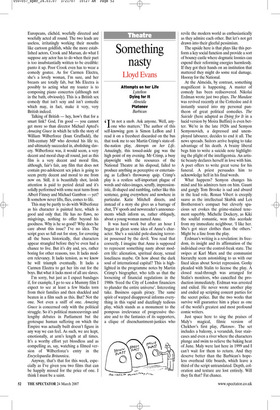Something nasty
Lloyd Evans
Attempts on her Life Lyttelton Dying for It Almeida Platonov Barbican ‘I’m not a snob. Ask anyone. Well, anyone who matters.’ The author of this self-knowing gem is Simon LeBon and I read it on a freesheet discarded on the bus that took me to see Martin Crimp’s state-ofthe-nation play, Attempts on her Life. Amazingly, this tossed-aside gag was the high point of my evening. Mr Crimp, a busy playwright with the resources of the National Theatre at his disposal, failed to produce anything as perceptive or entertaining as LeBon’s throwaway quip. Crimp’s play is a restless self-important plague of words and video-images, scruffy, impressionistic, ill-shaped and rambling, rather like this sentence, going everywhere and nowhere in particular. Katie Mitchell directs, and instead of a story she gives us a barrage of chat, TV spoofs and newsreader’s announcements which inform us, rather obliquely, about a young woman named Anne.
It was hard work but after an hour I began to glean some idea of Anne’s character. She’s a suicidal pole-dancing terrorist possessed by the devil. You read that correctly. I imagine that Anne is supposed to represent something nasty about modern life: alienation, spiritual decay, sexual loneliness maybe. Or how about the dark soul of international capital? This is highlighted in the programme notes by Martin Crimp’s biographer, who tells us that the loosening of financial regulations in the 1980s ‘freed the City of London financiers to plunder the entire universe’. Interesting take. Business equals piracy. The same spirit of warped disapproval informs everything in this vapid and dazzlingly tedious play, which stands as a monument to the pompous irrelevance of progressive theatre and to the fantasies of its supporters, a clique of disenchantment-junkies who revile the modern world as enthusiastically as they admire each other. But let’s not get drawn into their gleeful pessimism.
The upside here is that plays like this perform a key social function and provide a sort of bouncy castle where dogmatic loonies can expend their reforming energies harmlessly. If they got their hands on an institution that mattered they might do some real damage. Hooray for the National.
At the Almeida, by contrast, something magnificent is happening. A master of comedy has been rediscovered. Nikolai Erdman wrote just two plays. The Mandate was revived recently at the Cottesloe and it instantly soared into my personal pantheon of great political comedies. The Suicide (here adapted as Dying for It in a lucid version by Moira Buffini) is even better. We’re in the late 1920s and Semyon Semyonovich, a depressed and unemployed labourer, decides to end it all. The news spreads. Suitors arrive hoping to take advantage of his death. A brainy liberal begs him to write a suicide note highlighting the plight of the intelligentsia. An artistic beauty declares herself in love with him. A poet offers to write great verse for his funeral. A priest persuades him to acknowledge hell in his final words.
What happens? Semyon changes his mind and his admirers turn on him. Gaunt and gangly Tom Brooke is sad and absurd in the lead role. Ronan Vibert is creepily suave as the intellectual Skubik and Lex Brotherston’s compact but cleverly spacious set evokes the grime-stained tenement superbly. Michelle Dockery, as Kiki the soulful romantic, won this accolade from my immediate neighbour, ‘I like her. She’s got nicer clothes than the others.’ Might be a line from the play.
Erdman’s writing is a revelation: its freedom, its insight and its affirmation of the individual over the control-freak state. The swipes at Karl Marx and the communist hierarchy seem astonishing to us with our fixed ideas about Soviet repression. Gorky pleaded with Stalin to license the play. A closed read-through was arranged for Stalin’s monitors, who cancelled the production immediately. Erdman was arrested and exiled. He never wrote another play and ended up scripting concert parties for the secret police. But the two works that survive will guarantee him a place as one of the world’s greatest and most profound comic writers.
Just space here to sing the praises of Maly’s magical, filmic version of Chekhov’s first play, Platonov. The set includes a balcony, a verandah, four staircases and even a river where the characters plunge and swim to relieve the baking heat of June. Maly were last here in 1999 and I can’t wait for them to return. And they deserve better than the Barbican’s hopeless overhead title boards, which leave a third of the script untranslated. Depth, coloration and texture are lost entirely. Will they fix that? Fat chance.


















































































 Previous page
Previous page